#core python institute
Explore tagged Tumblr posts
Text

Core Python course in Jaipur
Python is an interpreted, object-oriented, high-level programming language with dynamic semantics. It is widely used for web development, system scripting, and software development. Python supports easy syntax which helps the developers to write the program in very few lines.
Learn Core Python Course in Jaipur India by Industry experts. Enroll for Core Python Programming Software at CAD Desk India. Find Core Python Programming training institutes near me and get Core Python Programming ✓Course fees ✓Class timings and ✓ Certification at CAD DESK
CAD DESK offers the best classroom training in India that helps the learner to get in-depth knowledge of various tools and libraries available in the AutoCAD software.
Python follows the interpreter system which enables it to execute the code as soon as it is written, which ultimately provides quick prototyping. Python is compatible with majorly all platforms like Windows, Linux, UNIX, and Mac, etc. It has a variety of built-in functions available which helps in creating the codes for the program very easily. CAD DESK has various courses in the field of IT, CAD, CAM & CAE and they always prioritize giving the best quality training to students. Moreover, while taking the coaching classes for Python, students are encouraged to do Internships.
0 notes
Text
Top bca,bsc,data science colleges bhubaneswar
Lakshya Institute of Technology, Bhubaneswar offers excellent placement support in leading IT companies for BCA, BSc ITM, BSc CS and BSc Data Science.
#top bca#bsc#data science colleges bhubaneswar#bca#bsc ITM#C#JAVA#PYTHON#ORACLE institute in Bhubaneswar#Best Bsc ITM(H) course college in Bhubaneswar#Best Bsc ITM Honours course college in Bhubaneswar#Top college for Bsc data science in Bhubaneswar#top bca colleges bhubaneswar#top bsc colleges bhubaneswar#DOTNET in bhubaneswar#php course in bhubaneswar#autocad course in bhubaneswar#data structure course bbsr#Best c++ course bhubaneswar#core java course in bhubaneswar#matlab courses in bhubaneswar#spoken English classes in Bhubaneswar#PGDCA course in bhubaneswar#AI/ML courses in bhubaneswar#Artificial intelligence courses in bhubaneswar
0 notes
Text
Internship Opportunities at Sunbeam Institute Pune
Internships are crucial for college students to gain practical experience and enhance their technical skills. Sunbeam Institute in Pune offers exceptional internships in fields like C programming, core Java, machine learning, web programming using Python, and .NET. These programs provide hands-on experience through real-world projects, guided by experienced mentors. For those interested in foundational coding skills, the C programming internship covers efficient coding practices and debugging techniques. The core Java internship delves into object-oriented programming, data structures, and algorithms, preparing students for robust software development careers.
Machine learning enthusiasts can engage in internships that involve data preprocessing, model training, and deployment using popular frameworks, equipping them with the skills to build intelligent systems. Web programming using Python internships focus on developing dynamic web applications, teaching students about frameworks like Django or Flask, database integration, and front-end development. For those keen on Microsoft technologies, the .NET internship covers C#, ASP.NET, and MVC architecture, along with cloud services, providing a comprehensive understanding of building scalable applications. Sunbeam Institute is renowned for its industry-aligned training, expert mentorship, and state-of-the-art facilities, making it a top choice for internships. Apply today through their official website to take the first step toward a successful tech career.
#“#Pune internships”#college internships”#Sunbeam Institute”#C programming internship”#core Java internship”#machine learning internship”#Python web programming”#Dot NET internship”
0 notes
Text
Python for Beginners: Launch Your Tech Career with Coding Skills
Are you ready to launch your tech career but don’t know where to start? Learning Python is one of the best ways to break into the world of technology—even if you have zero coding experience.
In this guide, we’ll explore how Python for beginners can be your gateway to a rewarding career in software development, data science, automation, and more.
Why Python Is the Perfect Language for Beginners
Python has become the go-to programming language for beginners and professionals alike—and for good reason:
Simple syntax: Python reads like plain English, making it easy to learn.
High demand: Industries spanning the spectrum are actively seeking Python developers to fuel their technological advancements.
Versatile applications: Python's versatility shines as it powers everything from crafting websites to driving artificial intelligence and dissecting data.
Whether you want to become a software developer, data analyst, or AI engineer, Python lays the foundation.
What Can You Do With Python?
Python is not just a beginner language—it’s a career-building tool. Here are just a few career paths where Python is essential:
Web Development: Frameworks like Django and Flask make it easy to build powerful web applications. You can even enroll in a Python Course in Kochi to gain hands-on experience with real-world web projects.
Data Science & Analytics: For professionals tackling data analysis and visualization, the Python ecosystem, featuring powerhouses like Pandas, NumPy, and Matplotlib, sets the benchmark.
Machine Learning & AI: Spearheading advancements in artificial intelligence development, Python boasts powerful tools such as TensorFlow and scikit-learn.
Automation & Scripting: Simple yet effective Python scripts offer a pathway to amplified efficiency by automating routine workflows.
Cybersecurity & Networking: The application of Python is expanding into crucial domains such as ethical hacking, penetration testing, and the automation of network processes.
How to Get Started with Python
Starting your Python journey doesn't require a computer science degree. Success hinges on a focused commitment combined with a thoughtfully structured educational approach.
Step 1: Install Python
Download and install Python from python.org. It's free and available for all platforms.
Step 2: Choose an IDE
Use beginner-friendly tools like Thonny, PyCharm, or VS Code to write your code.
Step 3: Learn the Basics
Focus on:
Variables and data types
Conditional statements
Loops
Functions
Lists and dictionaries
If you prefer guided learning, a reputable Python Institute in Kochi can offer structured programs and mentorship to help you grasp core concepts efficiently.
Step 4: Build Projects
Learning by doing is key. Start small:
Build a calculator
Automate file organization
Create a to-do list app
As your skills grow, you can tackle more complex projects like data dashboards or web apps.
How Python Skills Can Boost Your Career
Adding Python to your resume instantly opens up new opportunities. Here's how it helps:
Higher employability: Python is one of the top 3 most in-demand programming languages.
Better salaries: Python developers earn competitive salaries across the globe.
Remote job opportunities: Many Python-related jobs are available remotely, offering flexibility.
Even if you're not aiming to be a full-time developer, Python skills can enhance careers in marketing, finance, research, and product management.
If you're serious about starting a career in tech, learning Python is the smartest first step you can take. It’s beginner-friendly, powerful, and widely used across industries.
Whether you're a student, job switcher, or just curious about programming, Python for beginners can unlock countless career opportunities. Invest time in learning today—and start building the future you want in tech.
Globally recognized as a premier educational hub, DataMites Institute delivers in-depth training programs across the pivotal fields of data science, artificial intelligence, and machine learning. They provide expert-led courses designed for both beginners and professionals aiming to boost their careers.
Python Modules Explained - Different Types and Functions - Python Tutorial
youtube
#python course#python training#python#learnpython#pythoncourseinindia#pythoncourseinkochi#pythoninstitute#python for data science#Youtube
3 notes
·
View notes
Text
Diploma in Computer Application
A Diploma in Computer Application (DCA) is a popular short-term course that offers a solid foundation in computer fundamentals and applications. It's designed to equip individuals with the necessary skills to work in various IT-related roles.
Why Choose a DCA Course?
Quick and Efficient: DCA courses are typically shorter in duration, making it a time-effective way to acquire essential computer skills.
Practical Learning: The curriculum emphasizes hands-on training, allowing students to gain practical experience with software applications and hardware components.
Diverse Career Opportunities: A DCA certification opens doors to a wide range of job roles, including:
Data Entry Operator
Computer Operator
Web Designer
Software Tester
Technical Support Specialist
IT Assistant
Foundation for Further Studies: A DCA can serve as a stepping stone for higher education in computer science, information technology, or related fields.
Core Subjects in a DCA Course
Computer Fundamentals: Basic concepts of computers, hardware components, and software applications.
Operating Systems: Understanding and using various operating systems like Windows, Linux, and macOS.
Microsoft Office Suite: Proficiency in MS Word, Excel, PowerPoint, and Outlook.
Internet and Web Technologies: Basics of the internet, web browsing, email, and web development tools like HTML, CSS, and JavaScript.
Database Management Systems: Introduction to database concepts and SQL.
Programming Languages: Basic programming concepts in languages like C, C++, or Python.
How to Choose a Good DCA Institute
When selecting a DCA institute, consider the following factors:
Experienced Faculty: Ensure that the institute has experienced and knowledgeable faculty members.
Infrastructure: Well-equipped computer labs and other facilities are essential for practical learning.
Placement Assistance: A good institute should offer job placement assistance to help students secure employment.
Course Curriculum: The curriculum should be up-to-date and relevant to industry standards.
Fee Structure: Compare fees and financial aid options offered by different institutes.
By pursuing a Diploma in Computer Application, you can enhance your digital literacy, boost your career prospects, and stay relevant in the ever-evolving technological landscape.
2 notes
·
View notes
Text
BAR NONE
In theaters this weekend:

Sing Sing--A troupe of actors, all incarcerated, work to put up a show in the notorious maximum security state prison in New York. They're members of the institution's Rehabilitation Through the Arts program (RTA). At the center of the company is John "Divine G" Whitfield (Colman Domingo).
In prison for a crime he did not commit, Divine G not only throws his soul into his theatre work, playing Shakespearean leads like he should be onstage in Central Park, he also assists his fellow inmates with appeals and preparation for parole hearings.
His anger at the injustice of his circumstances is unmistakable, yet it's less scary than the intensity with which he works to control and channel it; he knows too well that giving vent to rage would be futile and harmful to his cause. Besides, he's a true believer. His positivity is an act of faith, sometimes a Herculean one.
Like its hero, the movie, directed by Greg Kwedar from a script he wrote with Clint Bentley, is taut and melodrama-free. Perhaps because so many of the actors were actually incarcerated people--many of them RTA veterans playing themselves--Sing Sing has almost a documentary feel at times. Yet it also has, with almost no violence or other prison-movie cliches, the charge of high drama. Clarence "Divine Eye" Maclin and Sean San José are particularly memorable among the other company members. A word should also be said for Paul Raci, who plays Brent Buell, the diplomatic, unflappable director and playwright.
But the core of the film is Colman Domingo. Rarely does an actor gives us so much heart to invest in with so little hamming or telegraphing. It's a classic performance, both for its emotional impact and for its discipline.

My Penguin Friend--It's hard to go wrong with penguins. They've been amusing us for a long time, not just in zoos but in movies. like George Miller's mad animated musical epic Happy Feet and its sequel, and Surf's Up, and the crack team of penguins in the Madagascar franchise, and Mr. Popper's Penguins, and the 2005 French documentary March of the Penguins, back though the exploding penguin and the giant penguin in Monty Python, not to mention Chilly Willy and Bugs Bunny's friend "Playboy Penguin," who wept tiny ice cubes when he was sad.
It's also hard to go wrong with Jean Reno. Best known as menacing killers in Luc Besson films like La Femme Nikita and The Professional, the rugged-looking French actor projects an air of effortless authority. So My Penguin Friend, which has both Jean Reno and a jaunty, spirited penguin in starring roles, starts out with certain advantages. And it ends up needing both of them.
This family film is, to use its opening titles, "Inspired by a True Story." In 2011, a man named Joao Pereira de Souza living on Ilha Grande, off the coast of Brazil, found a weakened, oil-slicked Magellanic penguin outside his house along the beach. He cleaned the poor flightless castaway up, fed him some sardines, and soon became friends with him. Dubbed "Dindim"--a grandchild's mispronunciation of the Portuguese word for penguin--the bird disappeared back into the Atlantic some months later. But he returned for many years thereafter, to hang out for the winter with Joao along his migratory route.
This fictionalized retelling of the story, directed by David Schurmann from a script by Kristen Lazarian and Paulina Lagudi Ulrich, starts off on the wrong foot with a tragic episode that seemed entirely gratuitous to me. And in its second half, it follows Dindim's encounters with researchers at his other home in Patagonia. These scenes feel very strained, with dialogue so stilted I began to wonder if it had been written by AI. And the movie's final stretch, which attempts to generate some danger and suspense, feels extremely half-hearted.
In between all this, however, we get to see Jean Reno, looking scruffy and soulful and beaky-faced as Joao, tenderly interacting with a penguin. That can carry a movie a long way. Reno seems to enjoying playing a childlike sweetness here, as Joao proclaims that Dindim "comes and goes as he pleases" and is "not my pet...he's my friend." The other humans in the film, including Adriana Barraza as Joao's wife, are all attractive, even when the dialogue coming out of them seems canned.
The movie is visually impressive, too. Dindim was played by several different penguins, and presumably his adventures, particularly underwater, have been at least partly enhanced by CGI, but it's pretty effective and seamless; he comes across as a character. And the scenery, both in windswept Patagonia and idyllic-looking Ilha Grande, is breathtaking.
So it will be a matter of personal calculation for you to decide if a penguin, a bona fide international movie star and gorgeous settings overcome feeble kid-movie devices enough to make My Penguin Friend worth your time. For me, it was; the penguin tipped the scale the farthest.

Alien: Romulus--A band of young scavengers bust into a huge derelict spaceship in orbit around the cheerless, sunlight-free mining planet on which they live. They're hoping to filch equipment that will allow them to escape their indenture, and they repeatedly express confidence that they'll be in and out in half an hour, and nothing can go wrong.
So in they go, get the stuff they need, and sail off to a new world where they live happily ever after. The end.
Just kidding. The result, in this seventh entry in the Alien series, is of course another gory encounter with an infestation of the elegantly spindly, terrifying creatures in all of their various stages of development, from "facehugger" to "chestburster" to full-grown fang-bearer.
Though it's not close to the 1979 original, Romulus is on the more watchable end of the franchise, deliberate and creepy for the first half, and non-stop in the second. It's a little unvaried and dark, however, and until the climactic scenes it doesn't really give us much that's new. Toward the end, the shots of the ice ring around the planet that the ship is approaching have a certain magical beauty, but otherwise we're mostly stuck in the chiaroscuro space dungeon.
The star is Cailee Spaeny, who played the fresh-faced young journalist in Civil War earlier this year. She's sympathetic, but the movie is stolen by David Jonnson as her companion Andy, a sweet, dad-joke-dispensing android who gets a reboot that gives him an upsetting personality change. Andy may be the best robot with divided loyalties since Robby in Forbidden Planet.
One more note: I'm a little over the vogue for gynecological/obstetric body horror. We got a big dose of nasty surgical instruments and moaning, keening young women birthing unnatural spawn earlier this year in The Last Omen; we get more natal splatter here. The gifted director of Romulus, the Uruguayan Fede Alvarez, also showed unsavory interest in coercive pregnancy in his terrific 20I6 shocker Don't Breathe. Even the title Romulus refers to one species nursed at the teat of another.
Could all this be a reaction to post-Roe reproductive chaos? I'll leave that to graduate students with stronger stomachs than mine.
#sing sing movie#colman domingo#greg kwedar#my penguin friend#jean reno#alien romulus#cailee spaeny#david jonsson#fede alvarez#rodo sayagues
3 notes
·
View notes
Text
The Value of a BCA Degree: Is It Worth Pursuing?
In the rapidly evolving landscape of technology and business, the Bachelor of Computer Applications (BCA) degree has emerged as a popular choice for students aiming to carve out a career in the IT sector. As technology continues to influence every aspect of our lives, the demand for skilled professionals in the field has never been higher. But is a BCA degree truly worth pursuing? Let’s explore the benefits and considerations to help you determine if this path aligns with your career goals.
What is a BCA Degree?
A Bachelor of Computer Applications (BCA) is a three-year undergraduate program designed to provide students with a strong foundation in computer science and applications. The curriculum typically covers programming languages, software development, database management, networking, and other core areas of IT. In addition to technical skills, BCA programs often include training in problem-solving and project management.
Benefits of Pursuing a BCA Degree
Foundation in IT Skills: The BCA program equips students with essential IT skills, including proficiency in programming languages like Java, C++, and Python. This foundation is crucial for any career in technology and prepares students for various technical roles.
Diverse Career Opportunities: Graduates of BCA programs can pursue a wide range of careers in IT and related fields. Job roles such as software developer, web developer, system analyst, and network administrator are just a few examples. Additionally, the skills gained from a BCA degree can also be applicable in sectors such as finance, healthcare, and education.
Gateway to Advanced Studies: For those interested in further specialization, a BCA degree can serve as a stepping stone to advanced degrees such as a Master’s in Computer Applications (MCA) or a Master’s in Business Administration (MBA). These advanced degrees can open doors to higher-level positions and increased earning potential.
Practical Experience: Many BCA programs emphasize practical experience through internships, projects, and industry collaborations. This hands-on approach helps students gain real-world experience, making them more attractive to potential employers.
Growing Demand for IT Professionals: The tech industry continues to expand globally, and the demand for skilled IT professionals is on the rise. A BCA degree can provide a competitive edge in a job market that increasingly values technological expertise.
Considerations Before Pursuing a BCA Degree
Cost and Duration: While a BCA degree is often less expensive than a four-year engineering degree, it’s still a financial commitment. It’s important to weigh the cost of tuition against the potential return on investment in terms of job opportunities and salary.
Job Market Saturation: In some regions, the job market for IT professionals can be competitive. It’s important to research local job markets and employment trends to ensure that there are sufficient opportunities available.
Interest in IT: A BCA degree requires a strong interest in technology and computer science. If you’re not passionate about these fields, you might find the coursework challenging and less engaging.
Long-Term Career Goals: Consider how a BCA degree aligns with your long-term career goals. If you aim to work in highly specialized or advanced IT roles, you may need additional qualifications or experience beyond a BCA degree.
Alternative Paths: There are various alternative paths to a career in IT, such as coding bootcamps, certifications, and online courses. These alternatives can sometimes offer a more flexible or cost-effective route to entering the tech industry.
RERF , while primarily known for its research on radiation exposure and health effects, is not directly related to educational institutions like BCA colleges. However, for students interested in a Best BCA college in Kolkata, the city offers several reputable options that provide a solid foundation in computer applications and technology. These colleges prepare students for diverse IT careers and often include advanced research opportunities in their curriculum. If you're looking to pursue a BCA in Kolkata, you'll find institutions that can equip you with the skills needed for a successful career in the tech industry.
Conclusion
The Bachelor of Computer Applications (BCA) degree offers a solid foundation in computer science and opens doors to numerous career opportunities in the technology sector. For those with a passion for IT and a desire to work in a rapidly growing field, the BCA degree can be a worthwhile investment. However, it's essential to consider your personal interests, career goals, and the job market in your area before making a decision. By carefully evaluating these factors, you can determine if a BCA degree aligns with your aspirations and offers the value you’re seeking in your educational and professional journey.
2 notes
·
View notes
Text
Is it possible to transition to a data scientist from a non-tech background at the age of 28?
Hi,
You can certainly shift to become a data scientist from a nontechnical background at 28. As a matter of fact, very many do. Most data scientists have actually shifted to this field from different academic and professional backgrounds, with some of them having changed careers even in their midlife years.

Build a Strong Foundation:
Devour some of the core knowledge about statistics, programming, and data analysis. Online classes, bootcamps—those are good and many, many convenient resources. Give it a whirl with Coursera and Lejhro for specific courses related to data science, machine learning and programming languages like Python and R.
A data scientist needs to be proficient in at least one or two programming languages. Python is the most used language for data science, for it is simple, and it has many libraries. R is another language that might come in handy for a data scientist, mostly in cases connected with statistical analysis. The study of manipulation libraries for study data and visualization tools includes Pandas for Python and Matplotlib and Seaborn for data, respectively.
Develop Analytical Skills:
The field of data science includes much analytics and statistics. Probability, hypothesis testing, regression analysis would be essential. These skills will help you derive meaningful information out of the data and also allow you to use statistical methods for real-world problems.
Practical experience is very important in the field of data science. In order to gain experience, one might work on personal projects or contribute to open-source projects in the same field. For instance, data analysis on publicly available datasets, machine learning, and creating models to solve particular problems, all these steps help to make the field more aware of skills with one's profile.
Though formal education in data science is by no means a requirement, earning a degree or certification in the discipline you are considering gives you great credibility. Many reputed universities and institutions offer courses on data science, machine learning, and analytics.
Connect with professionals in the same field: try to be part of communities around data science and attend events as well. You would be able to find these opportunities through networking and mentoring on platforms like LinkedIn, Kaggle, and local meetups. This will keep you abreast of the latest developments in this exciting area of research and help you land job opportunities while getting support.
Look out for entry-level job opportunities or internships in the field of data science; this, in effect, would be a great way to exercise your acquired experience so far. Such positions will easily expose one to a real-world problem related to data and allow seizing the occasion to develop practical skills. These might be entry-level positions, such as data analysts or junior data scientists, to begin with.
Stay Current with Industry Trends: Data science keeps on evolving with new techniques, tools, and technologies. Keep up to date with the latest trends and developments in the industry by reading blogs and research papers online and through courses.
Conclusion:
It is definitely possible to move into a data scientist role if one belongs to a non-tech profile and is eyeing this target at the age of 28. Proper approach in building the base of strong, relevant skills, gaining practical experience, and networking with industry professionals helps a lot in being successful in the transition. This is because data science as a field is more about skills and the ability to solve problems, which opens its doors to people from different backgrounds.
#bootcamp#data science course#datascience#python#big data#machinelearning#data analytics#ai#data privacy
3 notes
·
View notes
Text
DevOps for Beginners: Navigating the Learning Landscape
DevOps, a revolutionary approach in the software industry, bridges the gap between development and operations by emphasizing collaboration and automation. For beginners, entering the world of DevOps might seem like a daunting task, but it doesn't have to be. In this blog, we'll provide you with a step-by-step guide to learn DevOps, from understanding its core philosophy to gaining hands-on experience with essential tools and cloud platforms. By the end of this journey, you'll be well on your way to mastering the art of DevOps.
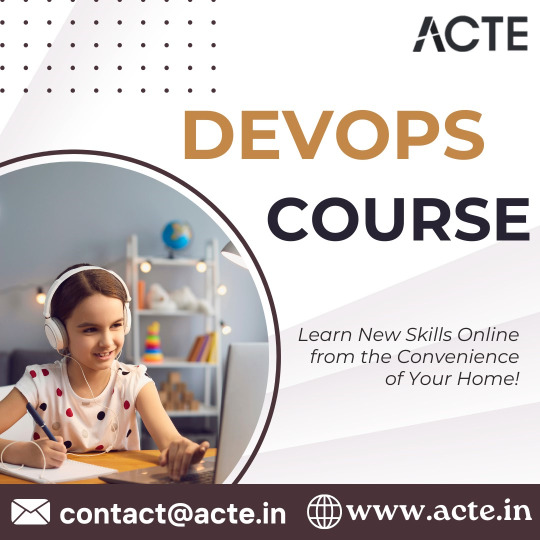
The Beginner's Path to DevOps Mastery:
1. Grasp the DevOps Philosophy:
Start with the Basics: DevOps is more than just a set of tools; it's a cultural shift in how software development and IT operations work together. Begin your journey by understanding the fundamental principles of DevOps, which include collaboration, automation, and delivering value to customers.
2. Get to Know Key DevOps Tools:
Version Control: One of the first steps in DevOps is learning about version control systems like Git. These tools help you track changes in code, collaborate with team members, and manage code repositories effectively.
Continuous Integration/Continuous Deployment (CI/CD): Dive into CI/CD tools like Jenkins and GitLab CI. These tools automate the building and deployment of software, ensuring a smooth and efficient development pipeline.
Configuration Management: Gain proficiency in configuration management tools such as Ansible, Puppet, or Chef. These tools automate server provisioning and configuration, allowing for consistent and reliable infrastructure management.
Containerization and Orchestration: Explore containerization using Docker and container orchestration with Kubernetes. These technologies are integral to managing and scaling applications in a DevOps environment.
3. Learn Scripting and Coding:
Scripting Languages: DevOps engineers often use scripting languages such as Python, Ruby, or Bash to automate tasks and configure systems. Learning the basics of one or more of these languages is crucial.
Infrastructure as Code (IaC): Delve into Infrastructure as Code (IaC) tools like Terraform or AWS CloudFormation. IaC allows you to define and provision infrastructure using code, streamlining resource management.
4. Build Skills in Cloud Services:
Cloud Platforms: Learn about the main cloud providers, such as AWS, Azure, or Google Cloud. Discover the creation, configuration, and management of cloud resources. These skills are essential as DevOps often involves deploying and managing applications in the cloud.
DevOps in the Cloud: Explore how DevOps practices can be applied within a cloud environment. Utilize services like AWS Elastic Beanstalk or Azure DevOps for automated application deployments, scaling, and management.
5. Gain Hands-On Experience:
Personal Projects: Put your knowledge to the test by working on personal projects. Create a small web application, set up a CI/CD pipeline for it, or automate server configurations. Hands-on practice is invaluable for gaining real-world experience.
Open Source Contributions: Participate in open source DevOps initiatives. Collaborating with experienced professionals and contributing to real-world projects can accelerate your learning and provide insights into industry best practices.
6. Enroll in DevOps Courses:
Structured Learning: Consider enrolling in DevOps courses or training programs to ensure a structured learning experience. Institutions like ACTE Technologies offer comprehensive DevOps training programs designed to provide hands-on experience and real-world examples. These courses cater to beginners and advanced learners, ensuring you acquire practical skills in DevOps.

In your quest to master the art of DevOps, structured training can be a game-changer. ACTE Technologies, a renowned training institution, offers comprehensive DevOps training programs that cater to learners at all levels. Whether you're starting from scratch or enhancing your existing skills, ACTE Technologies can guide you efficiently and effectively in your DevOps journey. DevOps is a transformative approach in the world of software development, and it's accessible to beginners with the right roadmap. By understanding its core philosophy, exploring key tools, gaining hands-on experience, and considering structured training, you can embark on a rewarding journey to master DevOps and become an invaluable asset in the tech industry.
7 notes
·
View notes
Text
Exploring Game-Changing Applications: Your Easy Steps to Learn Machine Learning:
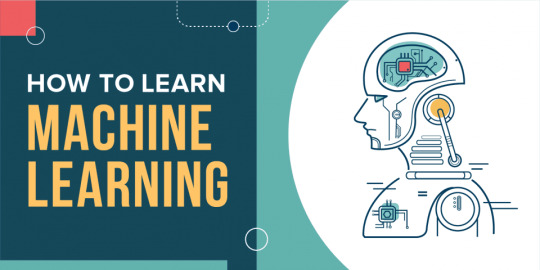
Machine learning technology has truly transformed multiple industries and continues to hold enormous potential for future development. If you're considering incorporating machine learning into your business or are simply eager to learn more about this transformative field, seeking advice from experts or enrolling in specialized courses is a wise step. For instance, the ACTE Institute offers comprehensive machine learning training programs that equip you with the knowledge and skills necessary for success in this rapidly evolving industry. Recognizing the potential of machine learning can unlock numerous avenues for data analysis, automation, and informed decision-making.
Now, let me share my successful journey in machine learning, which I believe can benefit everyone. These 10 steps have proven to be incredibly effective in helping me become a proficient machine learning practitioner:
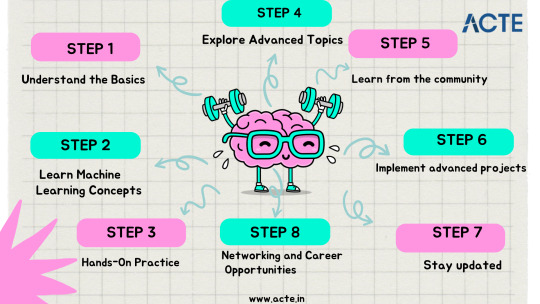
Step 1: Understand the Basics
Develop a strong grasp of fundamental mathematics, particularly linear algebra, calculus, and statistics.
Learn a programming language like Python, which is widely used in machine learning and provides a variety of useful libraries.
Step 2: Learn Machine Learning Concepts
Enroll in online courses from reputable platforms like Coursera, edX, and Udemy. Notably, the ACTE machine learning course is a stellar choice, offering comprehensive education, job placement, and certification.
Supplement your learning with authoritative books such as "Hands-On Machine Learning with Scikit-Learn, Keras, and TensorFlow" by Aurélien Géron and "Pattern Recognition and Machine Learning" by Christopher Bishop.
Step 3: Hands-On Practice:
Dive into real-world projects using both simple and complex datasets. Practical experience is invaluable for gaining proficiency.
Participate in machine learning competitions on platforms like Kaggle to challenge yourself and learn from peers.
Step 4: Explore Advanced Topics
Delve into deep learning, a critical subset of machine learning that focuses on neural networks. Online resources like the Deep Learning Specialisation on Coursera are incredibly informative.
For those intrigued by language-related applications, explore Natural Language Processing (NLP) using resources like the "Natural Language Processing with Python" book by Steven Bird and Ewan Klein.
Step 5: Learn from the Community
Engage with online communities such as Reddit's r/Machine Learning and Stack Overflow. Participate in discussions, seek answers to queries, and absorb insights from others' experiences.
Follow machine learning blogs and podcasts to stay updated on the latest advancements, case studies, and best practices.
Step 6: Implement Advanced Projects
Challenge yourself with intricate projects that stretch your skills. This might involve tasks like image recognition, building recommendation systems, or even crafting your own AI-powered application.
Step 7: Stay updated
Stay current by reading research papers from renowned conferences like NeurIPS, ICML, and CVPR to stay on top of cutting-edge techniques.
Consider advanced online courses that delve into specialized topics such as reinforcement learning and generative adversarial networks (GANs).
Step 8: Build a Portfolio
Showcase your completed projects on GitHub to demonstrate your expertise to potential employers or collaborators.
Step 9: Network and Explore Career Opportunities
Attend conferences, workshops, and meetups to network with industry professionals and stay connected with the latest trends.
Explore job opportunities in data science and machine learning, leveraging your portfolio and projects to stand out during interviews.
In essence, mastering machine learning involves a step-by-step process encompassing learning core concepts, engaging in hands-on practice, and actively participating in the vibrant machine learning community. Starting from foundational mathematics and programming, progressing through online courses and projects, and eventually venturing into advanced topics like deep learning, this journey equips you with essential skills. Embracing the machine learning community and building a robust portfolio opens doors to promising opportunities in this dynamic and impactful field.
9 notes
·
View notes
Text

Looking for C, JAVA, PYTHON, ORACLE institute in Bhubaneswar, Odisha then LIT- Lakshya Institute of Technology is the top college for you career. Start your journey and Get Placement in top IT Industry.For more information to visit us https://www.litindia.ac.in/cms/upcoming-batches
#C#JAVA#PYTHON#ORACLE institute in Bhubaneswar#Best Bsc ITM(H) course college in Bhubaneswar#Top college for Bsc datascience in Bhubaneswar#top bca#bsc#data#science colleges#bhubaneswar#bca#bsc ITM#datascience colleges#Spoken English in bhubaneswar#CATIA course in bhubaneswa#matlab courses in bhubaneswar#Dstc in bhubaneswar#core java course fees in bhubaneswar#php course in bhubaneswar#ccna course fees
0 notes
Text
Mastering Data Analytics: Your Path to Success Starts at Corpus Digital Hub
Corpus Digital Hub is more than just a training institute—it's a hub of knowledge, innovation, and opportunity. Our mission is simple: to empower individuals with the skills and expertise needed to thrive in the fast-paced world of data analytics. Located in the vibrant city of Calicut, our institute serves as a gateway to endless possibilities and exciting career opportunities.
A Comprehensive Approach to Learning
At Corpus Digital Hub, we believe that education is the key to unlocking human potential. That's why we offer a comprehensive curriculum that covers a wide range of topics, from basic data analysis techniques to advanced machine learning algorithms. Our goal is to provide students with the tools and knowledge they need to succeed in today's competitive job market.
Building Strong Foundations
Success in data analytics begins with a strong foundation. That's why our courses are designed to provide students with a solid understanding of core concepts and principles. Whether you're new to the field or a seasoned professional, our curriculum is tailored to meet your unique needs and aspirations.
Hands-On Experience
Theory is important, but nothing beats hands-on experience. That's why we place a strong emphasis on practical learning at Corpus Digital Hub. From day one, students have the opportunity to work on real-world projects and gain valuable experience that will set them apart in the job market.
A Supportive Learning Environment
At Corpus Digital Hub, we believe that learning is a collaborative effort. That's why we foster a supportive and inclusive learning environment where students feel empowered to ask questions, share ideas, and explore new concepts. Our experienced faculty members are dedicated to helping students succeed and are always available to provide guidance and support.
Cultivating Future Leaders
Our ultimate goal at Corpus Digital Hub is to cultivate the next generation of leaders in data analytics. Through our rigorous curriculum, hands-on approach, and supportive learning environment, we provide students with the tools and confidence they need to excel in their careers and make a positive impact on the world.
Join Us on the Journey
Are you ready to take the next step towards a brighter future? Whether you're a recent graduate, a mid-career professional, or someone looking to make a career change, Corpus Digital Hub welcomes you with open arms. Join us on the journey to mastery in data analytics and unlock your full potential.
Contact Us Today
Ready to get started? Contact Corpus Digital Hub to learn more about our programs, admissions process, and scholarship opportunities. Your journey towards success starts here!
Stay connected with Corpus Digital Hub for the latest news, updates, and success stories from our vibrant community of learners and educators. Together, we'll shape the future of data analytics and make a difference in the world!

#data analytics#data science#machinelearning#Data Visualization#Business Intelligence#big data#Data Mining#Business Analytics#Data Exploration#Data Analysis Techniques#Data Analytics Certification#Data Analytics Training#Data Analyst Skills#Data Analytics Careers#Data Analytics Jobs#Data Analytics Industry
2 notes
·
View notes
Text
The Ever-Evolving Canvas of Data Science: A Comprehensive Guide
In the ever-evolving landscape of data science, the journey begins with unraveling the intricate threads that weave through vast datasets. This multidisciplinary field encompasses a diverse array of topics designed to empower professionals to extract meaningful insights from the wealth of available data. Choosing the Top Data Science Institute can further accelerate your journey into this thriving industry. This educational journey is a fascinating exploration of the multifaceted facets that constitute the heart of data science education.
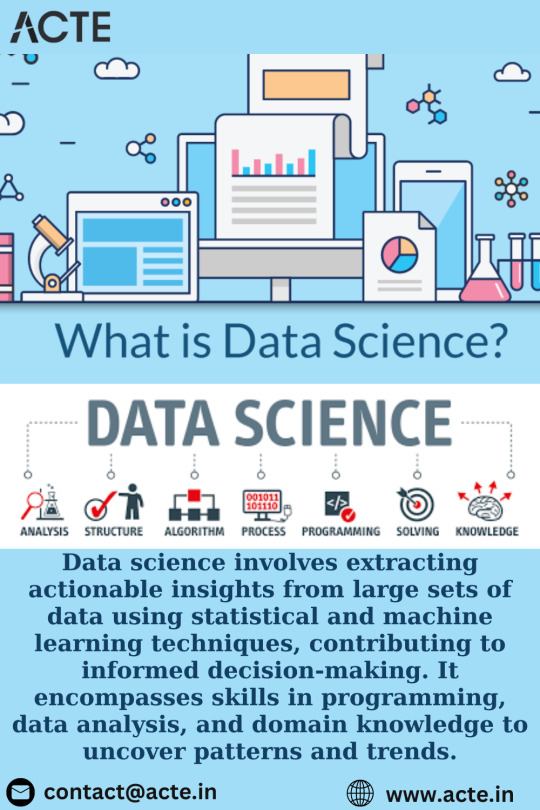
Let's embark on a comprehensive exploration of what one typically studies in the realm of data science.
1. Mathematics and Statistics Fundamentals: Building the Foundation
At the core of data science lies a robust understanding of mathematical and statistical principles. Professionals delve into Linear Algebra, equipping themselves with the knowledge of mathematical structures and operations crucial for manipulating and transforming data. Simultaneously, they explore Probability and Statistics, mastering concepts that are instrumental in analyzing and interpreting data patterns.
2. Programming Proficiency: The Power of Code
Programming proficiency is a cornerstone skill in data science. Learners are encouraged to acquire mastery in programming languages such as Python or R. These languages serve as powerful tools for implementing complex data science algorithms and are renowned for their versatility and extensive libraries designed specifically for data science applications.
3. Data Cleaning and Preprocessing Techniques: Refining the Raw Material
Data rarely comes in a pristine state. Hence, understanding techniques for Handling Missing Data becomes imperative. Professionals delve into strategies for managing and imputing missing data, ensuring accuracy in subsequent analyses. Additionally, they explore Normalization and Transformation techniques, preparing datasets through standardization and transformation of variables.
4. Exploratory Data Analysis (EDA): Unveiling Data Patterns
Exploratory Data Analysis (EDA) is a pivotal aspect of the data science journey. Professionals leverage Visualization Tools like Matplotlib and Seaborn to create insightful graphical representations of data. Simultaneously, they employ Descriptive Statistics to summarize and interpret data distributions, gaining crucial insights into the underlying patterns.
5. Machine Learning Algorithms: Decoding the Secrets
Machine Learning is a cornerstone of data science, encompassing both supervised and unsupervised learning. Professionals delve into Supervised Learning, which includes algorithms for tasks such as regression and classification. Additionally, they explore Unsupervised Learning, delving into clustering and dimensionality reduction for uncovering hidden patterns within datasets.
6. Real-world Application and Ethical Considerations: Bridging Theory and Practice
The application of data science extends beyond theoretical knowledge to real-world problem-solving. Professionals learn to apply data science techniques to practical scenarios, making informed decisions based on empirical evidence. Furthermore, they navigate the ethical landscape, considering the implications of data usage on privacy and societal values.
7. Big Data Technologies: Navigating the Sea of Data
With the exponential growth of data, professionals delve into big data technologies. They acquaint themselves with tools like Hadoop and Spark, designed for processing and analyzing massive datasets efficiently.
8. Database Management: Organizing the Data Universe
Professionals gain proficiency in database management, encompassing both SQL and NoSQL databases. This skill set enables them to manage and query databases effectively, ensuring seamless data retrieval.
9. Advanced Topics: Pushing the Boundaries
As professionals progress, they explore advanced topics that push the boundaries of data science. Deep Learning introduces neural networks for intricate pattern recognition, while Natural Language Processing (NLP) focuses on analyzing and interpreting human language data.
10. Continuous Learning and Adaptation: Embracing the Data Revolution
Data science is a field in constant flux. Professionals embrace a mindset of continuous learning, staying updated on evolving technologies and methodologies. This proactive approach ensures they remain at the forefront of the data revolution.

In conclusion, the study of data science is a dynamic and multifaceted journey. By mastering mathematical foundations, programming languages, and ethical considerations, professionals unlock the potential of data, making data-driven decisions that impact industries across the spectrum. The comprehensive exploration of these diverse topics equips individuals with the skills needed to thrive in the dynamic world of data science. Choosing the best Data Science Courses in Chennai is a crucial step in acquiring the necessary expertise for a successful career in the evolving landscape of data science.
4 notes
·
View notes
Text
Best Python Training in Marathahalli, Bangalore – Become a Python Expert & Launch a Future-Ready Career!
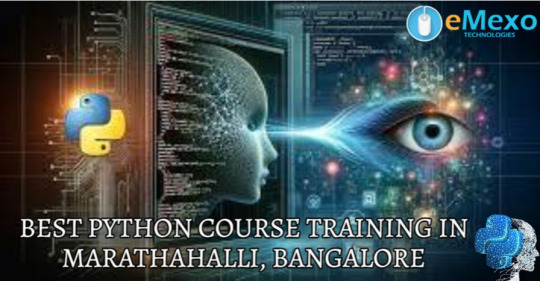
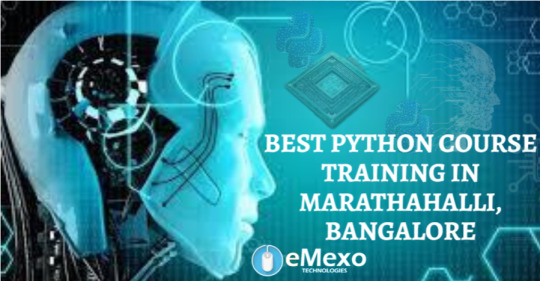




youtube
Want to master Python programming and build a successful IT career? Join eMexo Technologies for the Best Python Training in Marathahalli, Bangalore – your path to becoming a skilled Python developer with job-ready skills and industry certification.
Our Python Certification Course in Marathahalli, Bangalore is designed to equip you with in-demand programming skills, whether you're a beginner or an experienced professional. With real-time projects, hands-on exercises, and expert mentorship, you’ll gain the confidence to build real-world applications and secure your dream job.
🌟 Who Should Join Our Python Course in Marathahalli, Bangalore?
This Python Course in Marathahalli, Bangalore is ideal for:
Students and freshers looking to start their programming career
Software developers and IT professionals upskilling in Python
Data analysts and automation testers using Python for scripting
Anyone looking to crack technical interviews or get Python certified
📘 What You’ll Learn in Our Python Certification Course Marathahalli, Bangalore:
Core Python Programming: Variables, data types, loops, functions, OOP concepts
Advanced Python Concepts: File handling, exception handling, modules, decorators
Web Development with Python: Introduction to Django/Flask frameworks
Database Integration: Using Python with MySQL and SQLite
Automation & Scripting: Build scripts for real-time problem-solving
Live Projects: Real-world applications like calculators, dashboards, and web apps
🚀 Why Choose eMexo Technologies for Python Training in Marathahalli, Bangalore?
We are more than just a Python Training Center in Marathahalli, Bangalore – we are your learning partner. Our focus is on providing career-oriented Python training through certified instructors, hands-on practice, and real-time case studies.
What Makes Us the Best Python Training Institute in Marathahalli, Bangalore:
✅ Industry-expert trainers with real-world Python experience ✅ Fully-equipped classrooms and interactive online sessions ✅ 100% practical-oriented training with live project support ✅ Personalized career guidance, resume building & mock interviews ✅ Dedicated Python training placement in Marathahalli, Bangalore
📅 Upcoming Python Training Batch Details:
Start Date: July 1st, 2025
Time: 10:00 AM IST
Location: eMexo Technologies, Marathahalli, Bangalore
Mode: Both Classroom & Online Training Available
👥 Who Can Benefit from This Python Training Marathahalli, Bangalore?
Students & fresh graduates planning to enter the IT sector
Working professionals aiming to switch to Python development
Testers, analysts, and engineers looking to automate workflows
Anyone passionate about coding and application development
🎯 Get Certified. Get Placed. Get Ahead.
Join the top-rated Python Training Institute in Marathahalli, Bangalore and open doors to careers in software development, automation, web development, and data science.
📞 Call or WhatsApp: +91-9513216462 📧 Email: [email protected] 🌐 Website: https://www.emexotechnologies.com/courses/python-training-in-marathahalli-bangalore/
🚀 Limited Seats Available – Enroll Today and Start Your Python Journey!
🔖 Hashtags:
#PythonTrainingInMarathahalliBangalore#PythonCertificationCourseInMarathahalliBangalore#PythonCourseInMarathahalliBangalore#PythonTrainingCenterInMarathahalliBangalore#PythonTrainingInstituteInMarathahalliBangalore#eMexoTechnologies#PythonProjects#PythonTrainingPlacementInMarathahalliBangalore#ITTrainingBangalore#PythonJobs#BestPythonTrainingInstituteInMarathahalliBangalore#LearnPython#PythonProgramming#PythonForBeginners#Youtube
2 notes
·
View notes
Text
What It’s Like to Be a Full Stack Developer: A Day in My Life
Have you ever wondered what it’s like to be a full stack developer? The world of full stack development is a thrilling and dynamic one, filled with challenges and opportunities to create end-to-end solutions. In this blog post, I’m going to take you through a day in my life as a full stack developer, sharing the ins and outs of my daily routine, the exciting projects I work on, and the skills that keep me at the forefront of technology.

Morning Ritual: Coffee, Code, and Planning
My day typically begins with a strong cup of coffee and some quiet time for reflection. It’s during this peaceful morning routine that I gather my thoughts, review my task list, and plan the day ahead. Full stack development demands a strategic approach, so having a clear plan is essential.
Once I’m geared up, I dive into code. Mornings are often the most productive time for me, so I use this period to tackle complex tasks that require deep concentration. Whether it’s optimizing database queries or fine-tuning the user interface, the morning is when I make significant progress.
The Balancing Act: Frontend and Backend Work
One of the defining aspects of being a full stack developer is the constant juggling between frontend and backend development. I seamlessly switch between crafting elegant user interfaces and building robust server-side logic.

In the frontend world, I work with HTML, CSS, and JavaScript to create responsive and visually appealing web applications. I make sure that the user experience is smooth, intuitive, and visually appealing. From designing layouts to implementing user interactions, frontend development keeps me creatively engaged.
On the backend, I manage server-side scripting languages like Python and Node.js, ensuring that the data and logic behind the scenes are rock-solid. Databases, both SQL and NoSQL, play a central role in the backend, and I optimize them for performance and scalability. Building APIs, handling authentication, and managing server infrastructure are all part of the backend responsibilities.
Collaboration and Teamwork
Full stack development often involves collaborating with a diverse team of developers, designers, and project managers. Teamwork is a cornerstone of success in our field, and communication is key. I engage in daily stand-up meetings to sync up with the team, share progress, and discuss roadblocks.

Collaborative tools like Git and platforms like GitHub facilitate seamless code collaboration. Code reviews are a regular part of our workflow, ensuring that the codebase remains clean, maintainable, and secure. It’s in these collaborative moments that we learn from each other, refine our skills, and collectively push the boundaries of what’s possible.
Continuous Learning and Staying Updated
Technology evolves at a rapid pace, and staying updated is paramount for a full stack developer. In the afternoon, I set aside time for learning and exploration. Whether it’s delving into a new framework, exploring emerging technologies like serverless computing, or simply catching up on industry news, this dedicated learning time keeps me ahead of the curve. The ACTE Institute offers numerous Full stack developer courses, bootcamps, and communities that can provide you with the necessary resources and support to succeed in this field. Best of luck on your exciting journey!
The Thrill of Problem Solving
As the day progresses, I often find myself tackling unforeseen challenges. Full stack development is, at its core, problem-solving. Debugging issues, optimizing code, and finding efficient solutions are all part of the job. These challenges keep me on my toes and are a source of constant learning.
Evening Reflection: Wrapping Up and Looking Ahead
As the day winds down, I wrap up my work, conduct final code reviews, and prepare for the next day. Full stack development is a fulfilling journey, but it’s important to strike a balance between work and personal life.
Reflecting on the day’s accomplishments and challenges, I’m reminded of the rewarding nature of being a full stack developer. It’s a role that demands versatility, creativity, and adaptability, but it’s also a role that offers endless opportunities for growth and innovation.
Being a full stack developer is not just a job; it’s a way of life. Each day is a new adventure filled with code, collaboration, and the excitement of building end-to-end solutions. While the challenges are real, the satisfaction of creating something meaningful is immeasurable. If you’ve ever wondered what it’s like to be a full stack developer, I hope this glimpse into my daily life has shed some light on the dynamic and rewarding world of full stack development.
#full stack developer#frameworks#web development#web design#education#learning#information#technology
3 notes
·
View notes
Text
Best certification course academy in mumbai
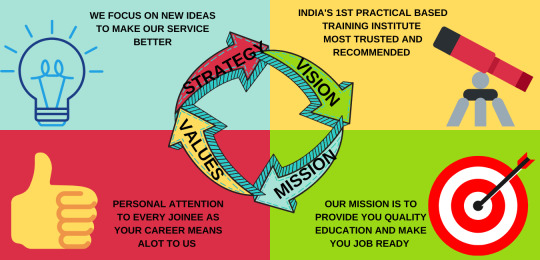
1.Upsurge Infotech - Practical knowledge is the key to success, and Upsurge Infotech, the best training institute in Mumbai, provides you with just that. With a team of experienced and certified professionals who have years of expertise in their respective fields, we offer comprehensive training programs in Software Testing, Digital Marketing, SAP ERP, Python, and other emerging technologies.
SoftwareTesting Courses in Mumbai
If you’re interested in learning about software testing courses in Mumbai then Upsurge Infotech has several courses and resources available that can help you develop your skills in this field. Software testing is a crucial process in the software development life cycle (SDLC) that involves evaluating a software application’s functionality, performance, and quality to identify any defects or errors. The goal of software testing is to ensure that the software meets the requirements, works as expected, and delivers a satisfactory user experience.
SAPCourses In Mumbai
If you’re interested in learning about SAP courses in Mumbai then Upsurge Infotech has several courses and resources available that can help you develop your skills in this field. SAP’s ERP software, known as SAP ERP, is one of their flagship products and provides comprehensive solutions for financial management, procurement, sales, production, and other core business functions. It enables businesses to consolidate their data, automate processes, and gain real-time insights into their operations.
DigitalMarketing Course in Mumbai
If you’re interested in learning Digital Marketing Course in Mumbai then Upsurge Infotech can help you develop your skills in this field. Digital marketing, in its most basic form, refers to any online marketing activities or properties. Email marketing, pay-per-click advertising, social media marketing, and even blogging are all examples of digital marketing that help people learn about your business and buy from you.
PythonCourse in Mumbai
If you’re interested in learning Python Course in Mumbai then Upsurge Infotech can help you develop your skills in this field. Python is a dynamically semantic, interpreted, object-oriented high-level programming language. Its high-level built-in data structures, together with dynamic typing and dynamic binding, making it ideal for Rapid Application Development and as a scripting or glue language for connecting existing components.
DataAnalyst Course in Mumbai
If you are searching for a Job that doesn’t require coding, then this digital analyst course in Mumbai is right for you. Upsurge Infotech offers a Data Analyst Training program it is the process of systematically applying statistical logical techniques to describe and illustrate, condense and recap, and evaluate data. To put it simply it’s a process in which an analyst Works with data to extract relevant information that may be used to guide decisions known as data analysis.
Mumbai Location: 2A-20, 3rd Floor, Viviana Building, inside Super Shopping Centre, near Khadi Gram Udyog, Swami Vivekananda Rd, next to T-10 showroom, Andheri West, Mumbai, Maharashtra 400058.
Thane Location: 602, 6th Floor, Ganesh Tower, Opp Thane West Platform #1, Dada Patil Wadi, Thane (W) - 400602.
2.LearnCoz - LearnCoz is a reputed computer institute located at 512, 2, Kalyan - Bhiwandi Road, Sapna Industrial Estate, Saravali, Mumbai. Our institute offers a wide range of computer courses to help individuals enhance their skills and stay competitive in the ever-evolving IT industry. Join us and unleash your potential in the world of computers.
3.DatapointComputer - Datapoint Computer is a renowned computer training institute based in Mulund West, Mumbai. Situated at 52 Saidham Arcade, P K Road, we offer high-quality computer training courses to help students acquire the skills needed to thrive in the IT industry. Join us and unlock your potential in the world of computers.
4.Wiztech - Wiztech is a leading institute providing software training with 100% placement assistance. Located at 4B/29, Phoenix Paragon Plaza, LBS Marg, Kurla West, Mumbai, we offer comprehensive courses that cover various software technologies. Upgrade your skills and secure a promising career in the IT sector with Wiztech.
5.VDMA - VDMA offers comprehensive courses in Digital Marketing, SEO, PPC, Wordpress, and Social Media. Located at Taximens Colony, 2B, 64, 6th Floor, LBS Marg, Kurla West, Mumbai, our institute equips students with the necessary skills to thrive in the digital world. Upgrade your digital marketing skills and unlock exciting career opportunities.
6.DGmarkInstitute - DGmark Institute is a highly acclaimed Digital Marketing Training Institute situated at 23, Ground Floor, Harmony Mall, New Link Road, Sejal Park, Colony No 1, Bhagat Singh II, Goregaon West, Mumbai. We provide top-notch training in digital marketing, equipping students with the knowledge and skills needed to excel in the digital era.
7.LIPSINDIA - LIPSINDIA is a premium destination for Digital Marketing Training in Mumbai. Located at 3/A Vrindhavan Bldg, Gr Floor, Behind Pantaloons, Umeda Ashram Road, Borivali West, Mumbai, we offer comprehensive courses that cover various aspects of digital marketing. Enhance your knowledge, upgrade your skills, and stay ahead in the competitive digital landscape.
8.ExcelRSolutions - ExcelR Solutions is your gateway to mastering Business Analyst Course. Located at 304, 3rd Floor, Pratibha Building, Three Petrol Pump, Opposite Manas Tower, Lal Bahadur Shastri Road, Pakhdi, Mumbai, our institute provides comprehensive training that is adaptable to everyone. Enhance your business analysis skills and open doors to new career possibilities.
9.Livewire - Livewire is a renowned IT institute located at 2B,22, Vivina, Apartment, Nadco Shopping Centre, Opposite Andheri Railway Station, S.V.Road, Andheri West, Mumbai. Our institute offers a wide range of courses, including web designing and IT-related disciplines. Upgrade your skills and unlock exciting career opportunities in the IT industry.
10.ChaloDigitalMarketingInstitute - Chalodigital Marketing Institute is your ultimate destination to learn awesome social media hacks and digital marketing strategies. Located at Raghuleela Mall Office No 310, First Floor, Behind Poisar Bus Depot, Boraspada Road, Jai Bhim Sanjay Nagar, Kandivali, Mumbai, our institute provides expert training in digital marketing to help individuals excel in the digital landscape.
2 notes
·
View notes